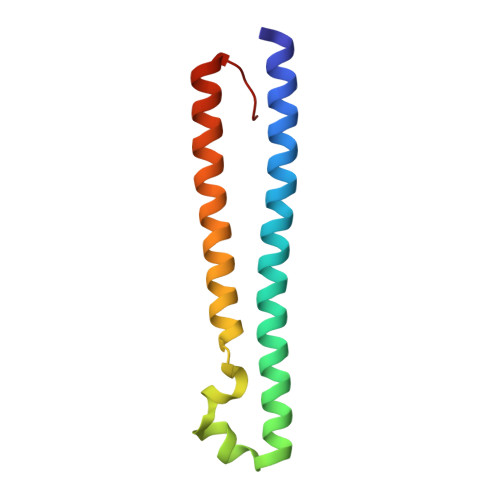Structural and mechanistic insights into the activation of Stromal interaction molecule 1 (STIM1).
Yang, X., Jin, H., Cai, X., Li, S., Shen, Y.(2012) Proc Natl Acad Sci U S A 109: 5657-5662
- PubMed: 22451904
- DOI: https://doi.org/10.1073/pnas.1118947109
- Primary Citation of Related Structures:
3TEQ, 3TER - PubMed Abstract:
Calcium influx through the Ca(2+) release-activated Ca(2+) (CRAC) channel is an essential process in many types of cells. Upon store depletion, the calcium sensor in the endoplasmic reticulum, STIM1, activates Orai1, a CRAC channel in the plasma membrane. We have determined the structures of SOAR from Homo sapiens (hSOAR), which is part of STIM1 and is capable of constitutively activating Orai1, and the entire coiled coil region of STIM1 from Caenorhabditis elegans (ceSTIM1-CCR) in an inactive state. Our studies reveal that the formation of a SOAR dimer is necessary to activate the Orai1 channel. Mutations that disrupt SOAR dimerization or remove the cluster of positive residues abolish STIM1 activation of Orai1. We identified a possible inhibitory helix within the structure of ceSTIM1-CCR that tightly interacts with SOAR. Functional studies suggest that the inhibitory helix may keep the C-terminus of STIM1 in an inactive state. Our data allowed us to propose a model for STIM1 activation.
Organizational Affiliation:
State Key Laboratory of Medicinal Chemical Biology, College of Life Sciences, Nankai University, Tianjin 300071, China.















